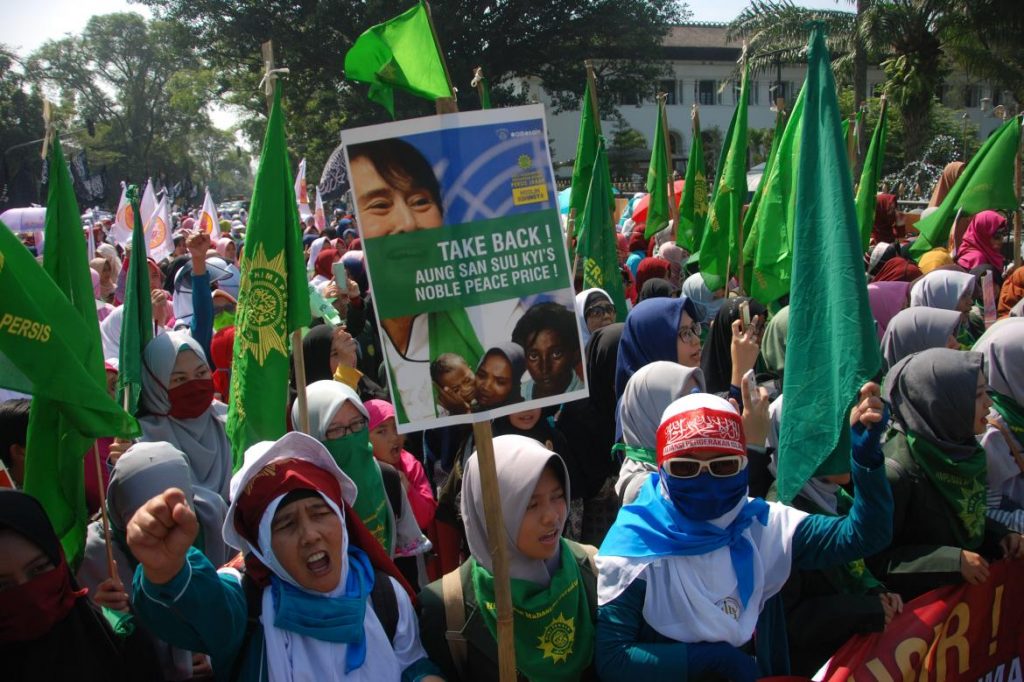By AFP
YANGON —Nobel peace laureate Malala Yousafzai and Muslim countries in Asia led a growing chorus of criticism on Monday aimed at Myanmar State Counsellor Daw Aung San Suu Kyi over the ongoing crisis in Rakhine State.
Nearly 90,000 Rohingya have flooded into Bangladesh in the past 10 days following an uptick in fighting between militants and Myanmar’s military in strife-torn western Rakhine state.
The recent violence, which kicked off last October when a small Rohingya militant group ambushed border posts, is the worst Rakhine has witnessed in years with the UN saying Myanmar’s army may have committed ethnic cleansing in its response.
Aung San Suu Kyi has come under increasing fire over her perceived unwillingness to speak out against the treatment of the Rohingya or chastise the military.
Support more independent journalism like this. Sign up to be a Frontier member.
She has made no public comment since the latest fighting broke out.
“Every time I see the news, my heart breaks at the suffering of the Rohingya Muslims in Myanmar,” Pakistani activist Yousafzai, who famously survived being shot in the head by the Taliban, said in a statement on Twitter.
“Over the last several years I have repeatedly condemned this tragic and shameful treatment. I am still waiting for my fellow Nobel laureate Aung San Suu Kyi to do the same,” she added.
Regional ire
The growing crisis threatens Myanmar’s diplomatic relations, particularly with Muslim-majority countries in Southeast Asia where there is profound public anger over the treatment of the Rohingya.
Indonesia’s foreign minister Retno Marsudi met Myanmar’s army chief Senior General Min Aung Hlaing in Naypyidaw on Monday in a bid to pressure the government to do more to alleviate the crisis.
“Once again, violence, this humanitarian crisis has to stop immediately,” Indonesian president Joko Widodo told reporters on Sunday as he announced Retno’s mission there.
Hours before Widodo spoke, a petrol bomb was thrown at Myanmar’s embassy in Jakarta while police there have previously dismantled two attempts by Islamist militants to bomb the compound.
Dozens demonstrated in front of the embassy on Monday, where armed police were deployed and the mission cordoned off behind barbed wire.
Pakistan’s foreign ministry released a statement saying it was “deeply concerned over reports of growing number of deaths and forced displacement of Rohingya Muslims” and urged Myanmar to investigate reports of atrocities against the community.
Muslim-majority Malaysia has also seen public protests since the latest round of Rakhine violence began.
“We urge for calm and restraint,” Prime Minister Najib Razak tweeted. “The dire situation facing our Rohingya brothers and sisters must be alleviated for good of Myanmar and region.”
Despite years of persecution, the Rohingya largely eschewed violence until October’s attacks by the little-known Arakan Rohingya Salvation Army.
Analysts have long warned that Myanmar’s treatment of the Rohingya would lead to homegrown militancy as well as support from international jihadists.
Since the latest fighting broke out, Al-Qaeda’s offshoot in Yemen has called for retaliatory attacks against Myanmar while the Afghan Taliban posted a statement on Facebook calling on Muslims to “use their abilities to help Myanmar’s oppressed Muslims”.
Defenders of Aung San Suu Kyi say she is severely limited in her ability to control Myanmar’s military.







